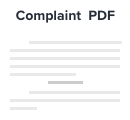-
Travel Sentry, Inc. v. Tropp DC CAFC
- 1:06-cv-06415
- E.D.N.Y.
- Judge: Eric N. Vitaliano
+1
- Filed: 12/04/2006
- Closed: 03/22/2021
- Latest Docket Entry: 03/23/2022
- PACER
- Docket updated daily
1
Plaintiff
2
Defendants
0
Accused
Products
2
Patents-in-Suit
5,223
Days in
Litigation
-
Travel Sentry, Inc. v. Tropp DC CAFC
- 1:06-cv-06415
- E.D.N.Y.
- Judge: Eric N. Vitaliano
+1
- Filed: 12/04/2006
- Closed: 03/22/2021
- Latest Docket Entry: 03/23/2022
- PACER
- Docket updated daily
Cause of Action
Declaratory Judgment
Patent Invalidity
Patent Non-Infringement
Patent Non-Infringement
Assigned Judge
Outcome Summary
- Patent Information
-
Validity & Enforceability
-
Infringement
David A. Tropp
- 2 Details
| Accused Product | Patent # | Claim # | Outcome |
|---|---|---|---|
| Travel Sentry''s travel lock | US 7,021,537 B2 |
1, 9, 10, 14
|
No infringement
Entry 154
|
| Travel Sentry''s travel lock | US 7,036,728 B2 |
1, 10
|
No infringement
Entry 154
|
